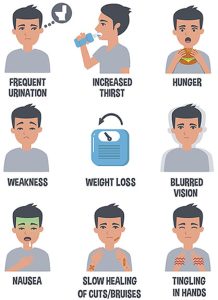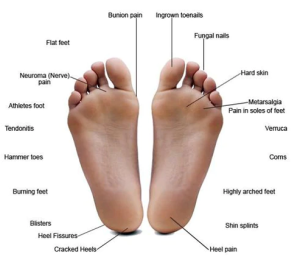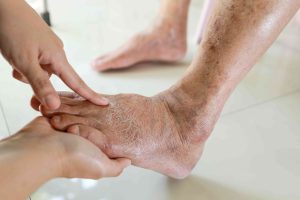A Medical Imaging Scientist, Dr. Livinus Abonyi, says the increasing incidence of diabetes mellitus in the country may be as a result of urbanisation and aging of the population.
Abonyi, also the Head, Department of Radiography, University of Lagos, made this known in an interview on Tuesday in Lagos.
He said that the prevalence of diabetes mellitus was still lower in traditional rural areas than urban communities due to the sophisticated and western lifestyle practised in the urban cities.

He defined diabetes as a non-communicable disease associated with increased level of glucose due to inadequate supply of insulin (known as Type 1 diabetes) or inability to use insulin efficiently (known as Type 2 diabetes).
He explained that diabetes mellitus increases with advancing age, saying that this could be because aging was often accompanied by decline in lean body mass and increase in body fat, particularly visceral adiposity, which may contribute to the development of insulin resistance.

Visceral adipose tissue is a hormonally active component of total body fat, which possesses unique biochemical characteristics that influence several normal and pathological processes in the human body.
Abonyi said: “The prevalence of diabetes mellitus is increasing worldwide, and it is projected that by the year 2030, over 500 million adults will be affected by diabetes mellitus.
“In Nigeria, many people are believed to be living with diabetes and the country’s diabetes prevalence rate is one of the highest in Africa.

“Though the exact cause of Type 1 diabetes is unknown, the probable causes are genetics and environmental factors (such as exposure to viruses). On the other hand, Type 2 diabetes is largely linked to unhealthy lifestyle choices,” he said.
Abonyi, who said that diabetes could be hereditary in nature, identified corruption, greed and lack of regulation as major contributory factors of the disease burden in Nigeria.
According to him, some few agencies of the government responsible for these regulatory functions are crippled by corruption while individuals involved in the production of such substandard products are driven by greed and avarice.
He decried that producers of substandard products have no conscience, love or regards to the effect the products might have on their fellow citizens that fall victim of their inordinate quest for wealth.
Aside the hereditary nature of diabetes, self medication is another factor that is promoting high incidence of diabetes in Nigeria
“No sane nation leaves her citizens to consume all kinds of food and drug products without effective regulation.
“In Nigeria, all kinds of drinks, noodles and food products are in circulation and freely consumed by the citizens without proper quality assurance and approval for consumption.

“Aside the hereditary nature of diabetes, self medication is another factor that is promoting high incidence of diabetes in Nigeria; there is a wide pervading attitude of self medication in Nigeria.
“An average Nigerian prescribes one type of drug or the other to the next neighbour, colleague or relation who complains of any illness, without proper investigation or diagnosis.
“The effect of this attitude applies even to fetus in the uterus, growing children and adults.
“No doubt, this attitude affects major organs of the body which helps the body in carrying out its metabolic functions effectively. These organs begin to fail early in life, which one of the outcomes is diabetes,” Abonyi said.
On the remedial measures in curbing the incidence of diabetes among the Nigerian population, Abonyi advised that the Nigerian leadership and the citizens have to do away with corruption.
He said that genuine declaration of war against corruption has to be instituted and exemplarily demonstrated by government leaders.
This, he said, would go a long way to strengthen regulations, build trust in the system and reduce criminality of production or importation of fake substandard goods.
The scientist emphasised that efforts should be made by the government agencies, non- governmental bodies, public health experts, health care practitioners, associations and the media in educating citizens on the best nutritional habits and practices.
“Corruption kills citizens if the citizens do not kill corruption in their system.
“Citizens should learn to surrender themselves to medical experts in registered hospitals when sick.
“The idea of self medication should be totally erased from people’s mind, as no one should take drug without due consultation and prescription by a medical practitioner.
“In order to make this practicable, the current National Health Insurance Act should come into full operation; this act has made health insurance compulsory for everyone,” Abonyi said.(NAN)


